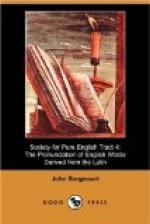SUFFIX IN [=A]LI. These adjectives shorten the _-a_ and, with the usual exceptions, the preceding vowels, as ‘d[’o]ctrinal’, ‘f[’i]lial’, ‘l[’i]beral’, ‘m[’a]rital’, ‘med[’i]cinal’, but of course by the ‘alias’ rule ‘arb[=o]real’ (not a classical word in Latin) and ‘g[=e]nial’. Words like ‘national’ and ‘rational’ were treated like trisyllables, which they now are. The stress is on the antepenultima except when heavy consonants bring it on to the penultima, as in ‘sepulcral’, ‘parental’, ‘triumphal’.
Those who say ‘doctr[’i]nal’ on the ground that the second vowel is long in Latin commit themselves to ‘medic[’i]nal’, ‘nat[’u]ral’, ‘nutr[’i]ment’, ‘instr[’u]ment’, and, if their own principle be applied, they make false quantities by the dozen every day of their lives.
Three words mostly mispronounced are, from their rarity, perhaps not past rescue. They are ‘d[’e]canal’, ‘rurid[’e]canal’, and ‘pr[’e]bendal’. There is no more reason for saying ‘dec[’a]nal’ than for saying ‘matr[’o]nal’ or for saying ‘preb[’e]ndal’ than for saying ‘cal[’e]ndar’. Of course words like ‘tremendous’, being imported whole, keep the original stress. In our case the Latin words came into existence as d[’e]can[’a]lis, pr[’e]bend[’a]lis, parallel with n[’a]tur[’a]lis, which gives us ‘n[’a]tural’. That mostly wrong-headed man, Burgon of Chichester, was correct in speaking of his rights or at any rate his claims as ‘d[’e]canal’.
STEMS IN -LO. Of these ‘stimulus’ and ‘villa’ have been borrowed whole, while umbella is corrupted into ‘umbrella’. Disyllables lengthen the penultima, as ‘stable’, ‘title’, ‘pupil’. Under French influence ‘disciple’ follows their example. In longer words the usual shortenings are made, as in ‘frivolous’, ‘ridiculous’. The older words in _-ulo_ change the suffix into _-le_, as ‘uncle’, ‘maniple’, ‘tabernacle’, ‘conventicle’, ‘receptacle’, ‘panicle’. Later words retain the u, as ‘vestibule’, ‘reticule’, ‘molecule’.
STEMS IN -NO. The many words of this class are a grief to the classifier, who seeks in vain for reasons. Thus ‘german’ and ‘germane’ have the same source and travelled, it seems, by the same road through France. The Latin hyacinth[)i]nus and adamant[)i]nus are parallel words, yet Milton has ‘hyacinthin’ for the one and ‘adamantine’ for the other. One classification goes a little way. Thus ‘human’ and ‘urban’ must have come through French, ‘humane’ and ‘urbane’ direct from Latin. On the other hand while ‘meridian’ and ‘quartan’ are French, ‘publican’, ‘veteran’, and ‘oppidan’ are Latin. Words with a long i, if they came early through France, shorten the vowel, as ‘doctrine’, ‘discipline’, ‘medicine’, and ‘masculine’, while ‘genuine’, though a later word, followed them, but ‘anserine’ and ‘leonine’ did not. Disyllables seem to prefer the stress on the ultima, as ‘divine’, ‘supine’, but even these are not consistent. Some critics would scan Cassio’s words




